Managing Offshore Teams: Best Practices & Tips for Success
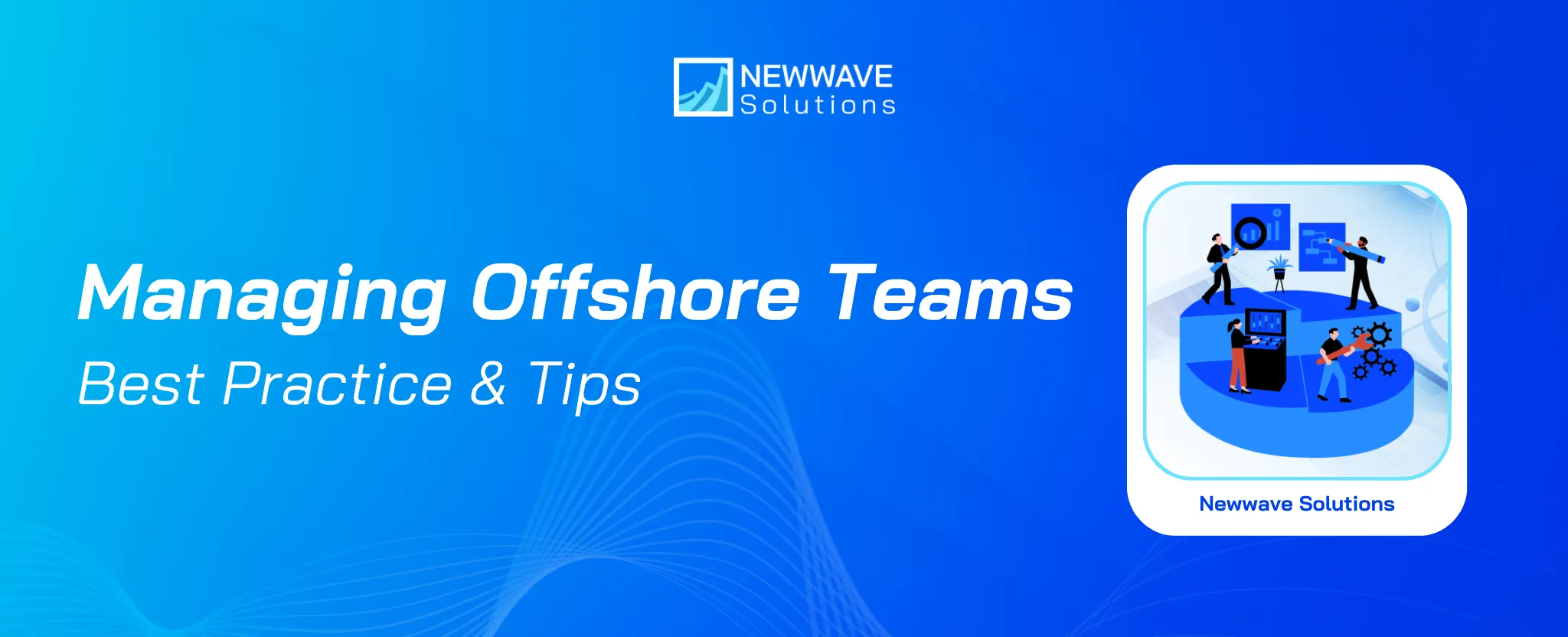
Managing offshore teams can unlock serious business growth—if you do it deliberately. Done right, you gain round-the-clock momentum, access to specialized talent, and a more resilient operating model. Done poorly, you invite delays, misalignment, and quality drift. At Newwave Solutions, we build and run distributed squads every day, so this guide distills the playbook: a clear definition, the real benefits, the tough challenges (with fixes), the day-to-day best practices, and the tools that make it all hum.
What is offshore team meaning?
An offshore team is a dedicated, long-term group of professionals, often engineers, designers, QA, or product roles, who work for you from another country. Unlike one-off, task-based outsourcing, an offshore team is integrated with your product roadmap, rituals, and tech stack. You guide strategy and priorities; the team provides ongoing capacity, capability, and velocity across time zones.
Think of it as building a second “office” in a region with great talent density and cost-to-value economics, then connecting that office tightly to your product and delivery engine.
Benefits of offshore teams:
- Follow-the-sun throughput: Handoffs enable real progress while your local team sleeps—perfect for support, releases, and rapid iteration.
- Access to deep, specialized talent: Tap into markets with strong engineering education and niche skills (cloud, data, mobile, testing, AI).
- Scalable capacity on demand: Add pods for new initiatives or reduce footprint after peak cycles without long-term overhead.
- Resilience and continuity: Work continues despite local holidays, regional disruptions, or attrition spikes in one market.
- Cost efficiency with quality: Rebalance your cost structure without compromising standards by pairing senior leads with growing talent.
- Diversity that sparks innovation: Multicultural teams surface alternative approaches and spot edge cases sooner.
- Time-zone leverage for speed: Async progress + short overlap windows compress cycle times when rituals are well designed.
- Employer brand expansion: Presence in talent-rich hubs strengthens recruiting pipelines and community ties.
If you need more insights, please visit more our blog for Offshore Software Development – An Ultimate Guide to Optimize Your Software Projects
Challenges for managing offshore teams
Most leaders cite the biggest challenges working with offshore teams are sustaining trust at distance, aligning quality and standards, navigating time zones and language differences, and keeping visibility high without micromanaging. The truth: each challenge is solvable with explicit agreements, light-weight process, and the right tools. Below, we unpack the core frictions and how to neutralize them:
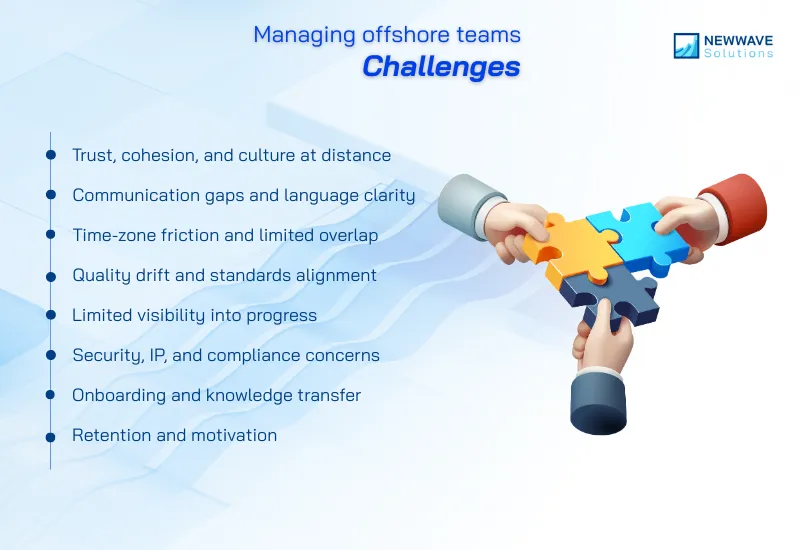
1. Trust, cohesion, and culture at distance
Building a sense of unity and mutual trust across borders can be difficult when people rarely meet in person. Without intentional effort, offshore teams can begin to feel disconnected from the main office, which impacts collaboration and morale. This lack of cohesion often leads to misunderstandings, duplicated effort, or a feeling of exclusion.
Solutions:
- Make offshore peers first-class citizens in roadmaps, demos, kudos, and incident reviews.
- Run virtual coffee chats and monthly “show & tell” to humanize collaboration.
- Pair programming / design reviews across locations to spread standards and context.
2. Communication gaps and language clarity
Communication remains one of the toughest aspects of offshore collaboration. Different languages, accents, and communication styles can easily lead to missed cues or misinterpretations. Even when everyone speaks the same business language, cultural differences in tone or hierarchy can complicate how feedback is shared.
Solutions:
- Publish a communication contract: channels by purpose (chat for quick, docs for decisions, tickets for work), response-time expectations, and escalation paths.
- Prefer plain language; confirm decisions in writing with owners, due dates, and success criteria.
- Use call recordings and transcripts for complex topics so no one misses details.
3. Time-zone friction and limited overlap
Time-zone differences are both a strength and a challenge for managing offshore teams. While 24-hour development cycles are possible, limited overlapping work hours often slow decision-making or delay responses. When teams don’t share common working hours, blockers can persist longer than necessary.
Solutions:
- Guarantee 90–120 minutes of overlap for daily stand-ups or planning.
- Use async decision templates (context, options, recommendation, deadline for objections).
- Install a daily handover ritual: last commit & status, next steps, blockers, and asks.
4. Quality drift and standards alignment
Maintaining consistent quality across multiple locations can be challenging when each team follows different habits, frameworks, or interpretations of “done.” These differences may result in inconsistent coding practices, uneven testing, or design variations. Over time, this drift can affect reliability and user experience.
Solutions:
- Codify definition of ready/done, code review checklists, and non-negotiable quality gates (linting, tests, SCA/SAST).
- Ship shared component libraries and design tokens to keep UX consistent.
- Track defect escape rate and lead time for changes; use trends to coach, not punish.
5. Limited visibility into progress
When leaders can’t easily observe day-to-day progress, offshore work can feel like a “black box.” Lack of transparency leads to either micromanagement or unpleasant surprises near deadlines. It becomes harder to predict delivery dates or identify blockers early.
Solutions:
- Visualize work with Kanban or sprint boards; keep WIP limits realistic.
- Weekly objective status: goals, what shipped, what slipped (with reason), risks, asks.
- Use working agreements on ticket hygiene: acceptance criteria, links to designs, and test notes.
6. Security, IP, and compliance concerns
Offshore operations often mean granting access to internal systems and sensitive data, which can increase exposure to security and compliance risks. Differing data protection laws, access controls, or device policies may complicate governance.
Solutions:
-
Enforce SSO, MFA, least-privilege IAM, and environment separation (dev/stage/prod).
-
Centralize secrets, automate dependency scanning, and require secure code training.
-
Define joiner/mover/leaver workflows to revoke access instantly.
7. Onboarding and knowledge transfer
When new offshore members join, they often face a steep learning curve due to time differences and limited direct guidance. Without structured onboarding, new hires can take longer to become productive, leading to repeated mistakes or dependency on key individuals who hold critical knowledge.
Solutions:
- Maintain a living runbook: architecture map, environments, workflows, glossary, Slack channels, and escalation contacts.
- Use buddy systems and guided issues (good first tickets) for the first 2–3 sprints.
- Record architecture deep dives and tribal-knowledge AMAs for self-serve learning.
8. Retention and motivation
High turnover is another recurring challenge in offshore environments. Talented engineers have many options, and a lack of recognition or professional development can make them feel disconnected or undervalued. Frequent attrition disrupts delivery rhythm and increases onboarding costs.
Solutions:
- Offer growth ladders (tech, product, leadership) and visible impact work.
- Recognize wins publicly; tie incentives to delivered outcomes and reliability.
- Run skip-level 1:1s quarterly to surface friction early.
How to manage offshore team in best practices?
Managing an offshore team is not just about delegating tasks overseas — it’s about building one strong team that happens to work from different places. The secret to success lies in three things: clarity, communication, and connection. You need clear goals that guide decisions, communication habits that prevent confusion, and human connection that keeps everyone motivated.
Whether you’re managing offshore development teams or cross-functional units, your goal is the same — to make people separated by oceans work as smoothly as if they were sitting in one office. Below are the best practices that make that possible.
1. Start with a Clear Vision Everyone Understands
Before your offshore team writes a single line of code or starts a project, they need to know why it matters. A clear, inspiring vision helps everyone see the bigger picture and understand how their work fits into your company’s goals.
When teams know the “why,” they naturally make better decisions on the “how.” Share your vision openly during kickoffs, team meetings, and updates. Use visuals — roadmaps, timelines, customer impact charts — to make it concrete. When the vision is clear, alignment comes naturally, even across time zones.
2. Create a Roadmap That Keeps Everyone Moving Together
A roadmap is more than a schedule — it’s your offshore team’s compass. Break your goals into short, clear phases or sprints with expected outcomes and delivery dates. This gives the team structure while leaving room for flexibility.
Make the roadmap visible to everyone through shared dashboards or project tools like Jira or Asana. Update it regularly and use it as a living document. When offshore teams can see where they’re going and how their work contributes, they don’t need constant supervision — they stay focused and self-directed.
3. Use Agile the Smart Way (Not the Hard Way)
Agile works perfectly for offshore collaboration — but only when adapted to your team’s reality. Instead of forcing everyone into the same rigid schedule, design Agile rituals that respect time zones.
Keep stand-ups short, focus on progress and blockers, and use asynchronous updates for backlog grooming or retrospectives. The goal isn’t endless meetings; it’s steady rhythm and fast feedback. Agile done right gives your offshore team the freedom to move quickly while staying connected to business goals.
4. Make Documentation Your Secret Weapon
When your team is scattered across the world, documentation becomes your best friend. Don’t rely on memory or one-on-one chats — write things down. Clear documentation turns chaos into order.
Keep all project details, workflows, architecture diagrams, and coding standards in one accessible place — Notion, Confluence, or Google Drive. Encourage everyone to update docs as they go, not afterward. This habit eliminates confusion, saves hours of back-and-forth, and ensures that knowledge stays even if people change roles.
5. Build a Smooth Daily Handover Process
Different time zones can slow projects down — or speed them up if you manage them well. The key is having a strong handover routine so work never stops when one team logs off.
At the end of each workday, have teams leave a short handover summary:
- What was completed today
- What’s in progress
- Any blockers or questions
- Next steps
This keeps tasks flowing seamlessly and reduces delays. Over time, you’ll turn time-zone differences into an advantage — your projects literally progress 24/7.
6. Define Quality from the Start
One of the biggest challenges in managing offshore teams is keeping the quality consistent. The fix? Set standards early and make them measurable.
Agree on what “done” means for every task — include testing requirements, documentation updates, and review steps. Use automated checks (linting, code review bots, CI/CD) to enforce standards without slowing down progress. When everyone knows what good looks like, quality stops being subjective and starts being predictable.
7. Focus on Results, Not Hours
Good managers don’t count keystrokes — they measure impact. Instead of tracking hours worked, focus on deliverables and performance indicators that show real progress.
Use metrics like lead time, deployment frequency, customer satisfaction, and sprint completion rates. Review results regularly in retrospectives to spot what’s working and what’s not. This approach builds trust and keeps motivation high because people are judged by outcomes, not online status.
8. Make Onboarding an Experience, Not an Afterthought
First impressions set the tone for long-term success. A well-planned onboarding process helps offshore team members understand your tools, culture, and expectations right away.
Prepare a welcome kit with everything they need — access to systems, documentation, mentors, and first-week goals. Assign a “buddy” to guide them through questions and processes. Celebrate their early wins to boost confidence and motivation. A thoughtful onboarding process creates loyalty and fast productivity from day one.
9. Keep Learning and Growing Together
Offshore teams thrive when they feel like they’re growing, not just grinding. Offer opportunities for learning and professional development — online courses, certifications, or internal knowledge-sharing sessions.
Encourage mentoring and cross-team learning. Celebrate skill improvements the same way you celebrate successful releases. Continuous learning turns offshore teams from task executors into long-term innovators who evolve with your business.
10. Treat Offshore Partners Like Strategic Allies
If your offshore team comes from an external partner or vendor, treat them as part of your company — not just a contractor. Clear expectations, regular feedback, and transparent communication make collaboration stronger.
Define measurable goals (SLAs), align on priorities every quarter, and hold review sessions to discuss results openly. When your offshore partner understands your vision and values, they work with the same commitment as your in-house team. True partnership drives innovation, not just output.
Learning how to manage offshore teams isn’t about rigid control — it’s about clarity, communication, and collaboration. When everyone knows what success looks like, has the right tools to achieve it, and feels genuinely part of the mission, distance stops being a barrier. Instead, it becomes your competitive advantage — a way to deliver better, faster, and smarter than ever before.
How to Hire Offshore Development Teams?
Knowing how to hire an offshore development team is about finding the right people, not just cheaper talent. The goal is to build a trusted extension of your in-house crew — one that shares your standards, culture, and communication rhythm. Whether you’re hiring directly or through hire offshore developers services, follow these steps to get it right.
- Define goals and scope clearly: Start with what success looks like — your project vision, required skills, and timeline. Clear expectations attract the right offshore talent and avoid future misalignment.
- Pick the right location: Choose countries known for skill, cost-efficiency, and stability. Vietnam, one of the best offshore software development countries, stands out for high-quality engineers and cultural compatibility.
- Evaluate potential partners: Review portfolios, case studies, and testimonials. Look for consistent delivery, transparent processes, and a good cultural fit — key for long-term offshore team management.
- Check technical & communication skills: Combine coding tests with scenario-based interviews to assess real problem-solving ability. Strong communication is just as important as technical expertise.
- Align on process and tools: Before hiring, agree on collaboration methods — Agile sprints, time tracking, reporting tools, and feedback loops. The best partners integrate smoothly into your workflow.
- Verify security and IP protection: Ask about access control, NDAs, and data compliance. Reliable offshore outsourcing companies protect your intellectual property as seriously as you do.
- Start small, scale fast: Run a short pilot project (2–6 weeks) to test collaboration before committing long-term. Use it to confirm quality, speed, and cultural alignment.
- Onboard and support effectively: Provide documentation, mentors, and clear communication channels from day one. A strong onboarding process helps your offshore developers deliver value immediately.
- Maintain open feedback loops: Review progress regularly using KPIs like delivery speed, quality, and satisfaction. Transparent feedback keeps teams motivated and aligned.
Hiring offshore teams the right way means investing in clarity and trust from the start. With the right partner, structured onboarding, and shared accountability, your offshore team becomes a seamless extension of your business — ready to deliver quality, speed, and innovation under one global vision.
Tools & Tips
When it comes to managing offshore teams, even the best strategy falls short without the right tools to back it up. Tools alone don’t fix broken processes — but the right stack helps good habits stick and turns collaboration into second nature. For distributed teams, your toolset acts as the digital “office”: it connects people, keeps work visible, and ensures consistency across time zones.
Below are the essential categories of tools and practical tips to help you manage offshore teams more effectively, covering everything from project visibility to productivity rhythm:
Project & Delivery Management
Managing complex projects across continents requires more than spreadsheets and email threads. Modern project management tools bring structure, accountability, and transparency to offshore collaboration. They make it easy to break projects into manageable tasks, track ownership, visualize progress, and identify bottlenecks early.
Recommended Tools:
- Jira / Azure Boards / ClickUp / Asana: Ideal for sprint planning, backlog prioritization, and tracking dependencies across distributed squads.
- Trello / Kanbanize: Best for visualizing workflows, particularly for operations or marketing teams where a clear Kanban board keeps work transparent.
- Notion / Confluence: Serve as your central knowledge base for project documentation, architecture decision records (ADRs), onboarding materials, and runbooks.
Tips:
- Keep tickets small and measurable, with clear acceptance criteria and links to designs or specifications.
- Use consistent labeling for environments, components, and risk areas to speed up triage and reduce confusion.
- Encourage teams to update boards daily so everyone — from developers to managers — can see what’s happening in real time.
Communication & Meetings
Clear communication is the lifeline of every offshore operation. Without the right communication tools and discipline, even the most talented team can fall into misalignment. The goal is to make information flow seamlessly — whether teams are chatting asynchronously, holding virtual meetings, or sharing quick visual updates.
Recommended Tools:
- Slack / Microsoft Teams: Create dedicated channels by team, project, or topic. Threads and pinned messages keep information organized and easy to find.
- Zoom / Google Meet: Use video conferencing for planning, retrospectives, and one-on-one sessions. Recording key discussions ensures clarity and knowledge retention.
- Loom: Perfect for short, asynchronous video updates — great for walkthroughs, UI demonstrations, or status explanations.
Tips:
- Establish a communication contract that defines channels, response-time expectations, and escalation paths.
- Protect overlapping hours for real-time collaboration, and schedule deep work or async tasks outside that window.
- Encourage empathy in communication — short, polite messages and written recaps go a long way in preventing misunderstanding.
Code, CI/CD, and Quality Assurance
In offshore software development, consistency and automation are critical. A well-integrated CI/CD pipeline ensures that code quality, testing, and deployment standards are met regardless of where team members are located. Automation replaces manual oversight, freeing up your team to focus on innovation instead of repetitive tasks.
Recommended Tools:
- GitHub / GitLab / Bitbucket: Centralized repositories for managing pull requests, code reviews, and version control. Standardize PR templates and review checklists to maintain consistency.
- CI/CD Platforms: GitHub Actions, GitLab CI, or CircleCI automate build, test, and deployment workflows for faster releases.
- Quality Gates: Use SonarQube, ESLint/Prettier, or testing frameworks like Playwright/Cypress for automated quality checks.
- Security Scanners: Integrate Snyk or Dependabot to monitor vulnerabilities and enforce dependency hygiene.
Tips:
- Require at least two approvals for critical code changes to maintain reliability and accountability.
- Track metrics like defect escape rate and flaky test ratio — these highlight where quality processes need refinement.
- Encourage engineers to add meaningful code comments and document key design decisions within the repo.
Knowledge & Decisions
Distributed teams thrive when knowledge is shared, not siloed. Documentation is your “memory,” and decision records prevent history from being rewritten with every new sprint. A solid knowledge management system ensures that offshore members can find information quickly and make informed choices without constant supervision.
Recommended Tools:
- PlantUML / Miro / Excalidraw: Ideal for creating architecture diagrams and workflows that can be versioned alongside the codebase.
- Docs-as-Code: Write documentation in Markdown and manage it via pull requests for easy review and searchability.
Tips:
- Use Architecture Decision Records (ADRs) to document important technical choices — include context, options considered, final decision, and consequences.
- Rotate a “documentation champion” every sprint or quarter to ensure that content stays accurate and up to date.
- Encourage asynchronous Q&A — let team members comment or suggest edits directly within the doc instead of asking repeatedly on chat.
Time, Capacity, and Async Coordination
Time-zone diversity is one of the main advantages of offshore collaboration — but it only works when time and workload are managed transparently. Time-tracking and scheduling tools keep teams aligned on priorities, deadlines, and available working hours.
Recommended Tools:
- Clockify / Toggl: Lightweight time tracking for compliance or client reporting. These help analyze where time goes and improve sprint estimates.
- Google Calendar: Use shared calendars for releases, meetings, and incident reviews so everyone stays aware of key events.
- World Time Buddy: Simplifies meeting scheduling across multiple time zones.
Tips:
- Maintain a shared PTO and holiday calendar to plan capacity realistically and prevent scheduling surprises.
- Designate certain days or hours as “no-meeting zones” for deep, focused work.
- Encourage async updates through written notes, voice memos, or short videos so people in different time zones stay informed without late-night calls.
AI-Assisted Productivity (Use Wisely)
AI tools are reshaping how offshore teams work — from accelerating code writing to auto-generating documentation. When used responsibly, they save time and improve accuracy. However, AI should support human judgment, not replace it.
Recommended Tools:
- GitHub Copilot / Codeium: Offer intelligent code suggestions and boilerplate automation for developers.
- Mintlify / Docusaurus: Simplify documentation creation and maintenance.
- Automated Review Tools: Use static analysis and AI-generated summaries to speed up PR reviews and maintain consistent quality.
Tips:
- Always have human oversight for architecture, security, and product-critical decisions.
- Treat AI outputs as drafts — verify and test before implementation.
- Use AI as a time-saver for repetitive work, not as a replacement for creative or strategic thinking.
Operating Rhythm Template
Even with the best tools, offshore success depends on rhythm — the cadence that keeps everyone aligned and accountable. A predictable operating rhythm builds trust, prevents burnout, and keeps momentum steady across global teams.
Suggested Rhythm:
- Daily: Quick stand-up during overlap hours; async handover updates before sign-off.
- Weekly: Sprint planning and demo, followed by risk or dependency review.
- Bi-Weekly: Retrospective with clear actions and owners.
- Monthly: Skill-sharing sessions or tech talks to keep learning continuous.
- Quarterly: Roadmap refresh and partner review (QBR) to realign long-term goals.
Maintaining this rhythm ensures consistent communication, continuous improvement, and cultural connection across borders — turning multiple time zones into one synchronized global workflow.
Frequently Asked Questions (FAQs)
I have offshore teams and with different time zones, how do I manage the situation?
Guarantee 90–120 minutes of overlap for decisions and stand-ups. Move everything else to async: handover notes, decision memos with a response deadline, and recorded demos. Keep a shared calendar of working hours, holidays, and releases. Rotate meeting times if teams are far apart to distribute the pain fairly.
What methods I can use to monitor my offshore team productivity?
Track outcomes and flow, not presence: lead time, deployment frequency, change failure rate, MTTR, and sprint goal completion. Add customer-visible quality metrics (defect escape rate, p95 latency, support backlog). Use dashboards tied to your board and CI/CD, and review trends in retros. Time trackers (when required) should inform planning—not micromanagement.
About offshore teams – what are the KPI’s?
They align outcomes, remove blockers, and protect team health. Practically: refine the backlog with product, maintain quality gates, orchestrate overlap windows and handovers, enforce documentation and security hygiene, nurture growth, and keep stakeholders informed with crisp, visual status updates. In short: they create the conditions for trust and autonomy.
Conclusion
Managing offshore teams is no longer a stop-gap for cost; it’s a durable way to build globally, ship faster, and stay resilient. The winning pattern is consistent: clear outcomes, lightweight but explicit process, shared standards, and human connection. When those are in place, distance becomes an advantage rather than a drag.
Why Newwave Solutions?
From our base in Vietnam, we assemble high-performing squads that plug into your roadmap, tech stack, and operating rhythm. You set outcomes; we deliver with disciplined engineering, transparent metrics, and thoughtful communication. Whether you’re adding one pod or scaling multiple value streams, we bring predictable delivery without the overhead.
- Need end-to-end builds or team extensions? We cover architecture, full-stack web/mobile, QA automation, cloud, data, and AI.
- Prefer measurable governance? Expect clear SLAs, sprint demos, and dashboards wired to DORA and customer metrics.
- Care about culture? We invest in onboarding, mentorship, and continuous learning so your team sticks—and gets better every sprint.
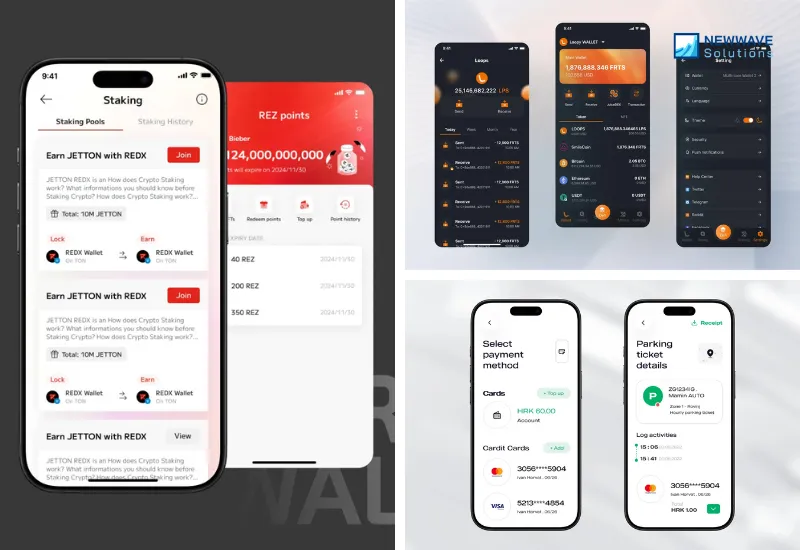
Whether you’re exploring offshore software development, considering offshore outsourcing, or looking for trusted offshore software companies in Vietnam, we’re here to help you scale with confidence. Our dedicated model and flexible hire offshore developers services make it easy to find the right fit, move fast, and stay in control.
Let’s make distance work for you. Partner with Newwave Solutions — and build an offshore team that works like your own.
To Quang Duy is the CEO of Newwave Solutions, a leading Vietnamese software company. He is recognized as a standout technology consultant. Connect with him on LinkedIn and Twitter.

Read More Guides
Get stories in your inbox twice a month.
Let’s Connect
Let us know what you need, and out professionals will collaborate with you to find a solution that enables growth.
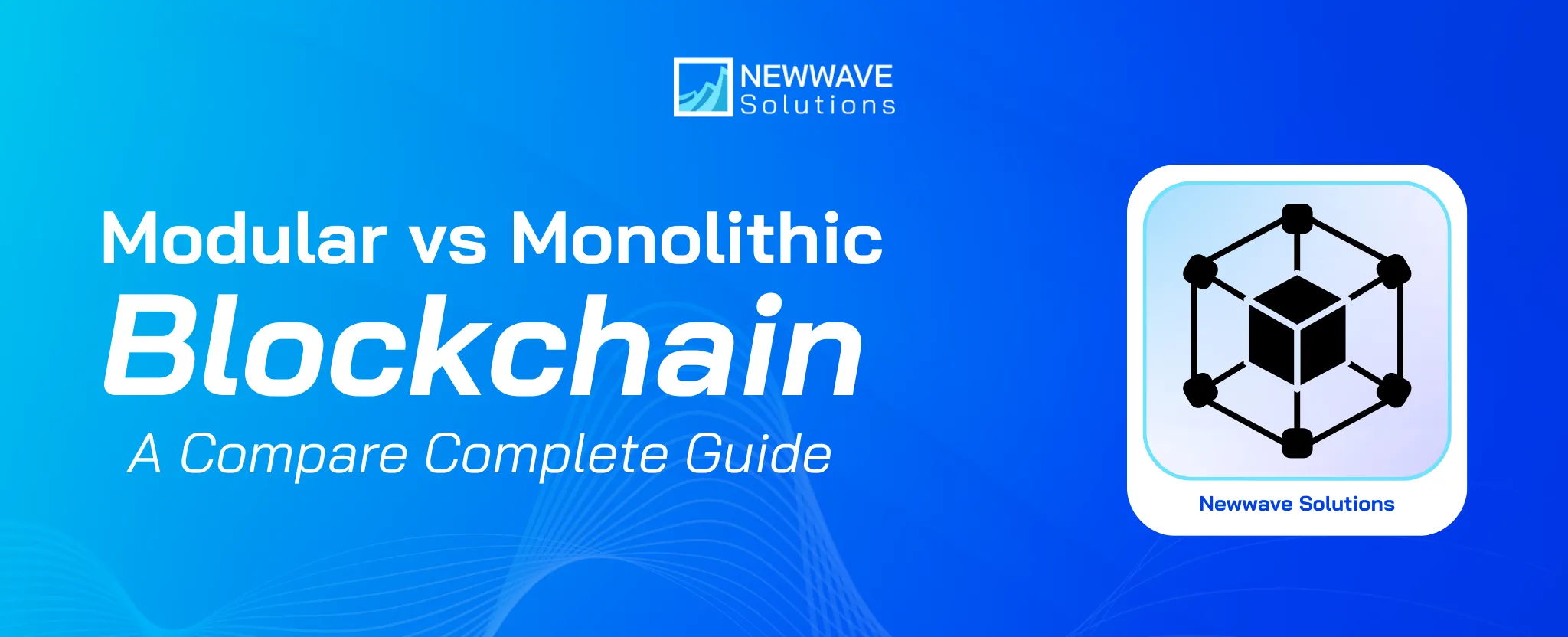

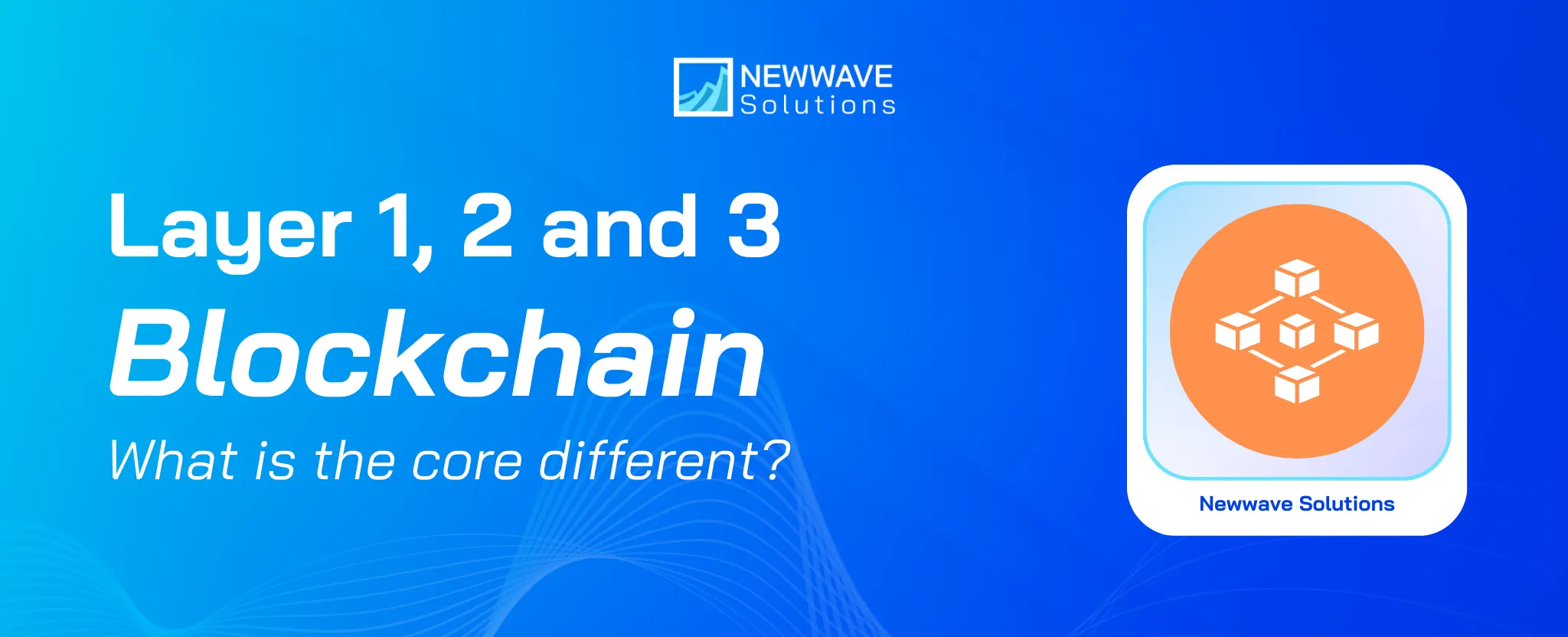
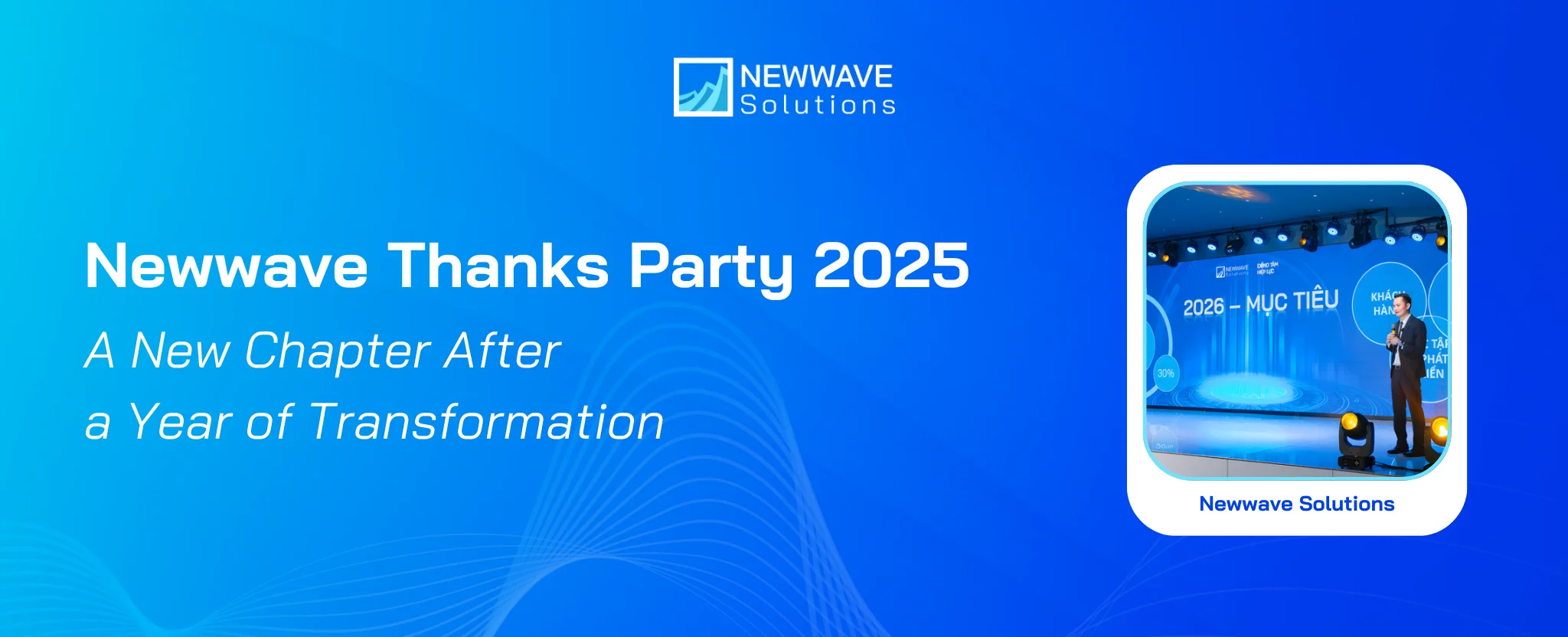
Leave a Reply